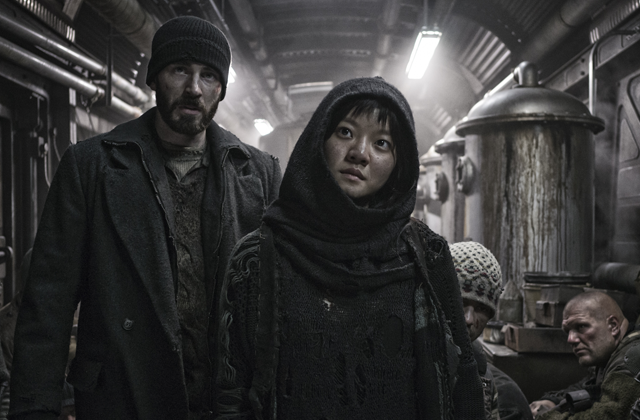Snowpiercer is the best action movie with depth since The Matrix

‘Snowpiercer’ has gotten a lot of praise, but hey, that’s because it’s awesome, dark, and brutal.
Ah, dystopian movies. They have been with us since the beginning of movies (Metropolis was in 1927), but that’s easy enough to answer, because life has never been free from worry or fear. Sure, there have been some brief periods where the concept waned, like the 40’s, where an actual war occupied our time or the 50’s, where everyone was cautiously optimistic about the future. By the 60’s however, we got things like Fahrenheit 451 (which has since proven well predicted in the rise of large screen TVs occupying our time) or Planet of the Apes. Of course, by the 70’s, we were overrun with everything from cannibalism worries representing worries about running out of resources in Soylent Green to fear of aging in Logan’s Run.
And they just have not stopped. Look at the success of The Hunger Games or even the optimistic dystopia in WALL-E; everyone’s worried about the future. One fear that’s come up a few times is climate change, although it’s a bit more recent an apocalyptic worry than others. Sure, The Day After Tomorrow was stupid, and Waterworld stupid and boring, but it can’t be argued that people are certainly worrying about it. But hey, just because a movie is about one thing doesn’t mean it can’t also be about something else. And boy, this movie is something else.
Snowpiercer comes from South Korean writer/director Bong Joon Ho, adapted from the French dystopian graphic novel Transperceneige. It tells the story of an alternate version of Earth in which the world has attempted to end global warming with an experimental new procedure. But instead, it ends up causing a new Ice Age, and most of the world dies with the extreme cold. There are a few thousand survivors, all aboard a train that travels a rail that covers the entire world. As we learn, it was considered a stupid waste of money and boondoggle, but it now holds the last remnants of humanity. But just like in real life, not everyone is the same. In the front of the train, passengers gorge on luxuries and drug-filled raves while in the back, the grubby lower class subsist on disgusting protein bars, constantly brutalized by the train guards. Finally though, after seventeen years on aboard the train, the people are ready to attempt another revolt. And not the first they’ve attempted.
They are led by John Hurt as Gilliam, and old man who knows much about the train and once was in the front of the train. His main muscle and tactical man is Curtis, played by a bearded Chris Evans, who is working with a team of people (including Octavia Spencer as a mother who’s lost everything and Jamie Bell, a youngster who idealizes Curtis and was born on the train) from all walks of life and all over the globe. After all, it’s the entire world that is under ice and snow. But their efforts are pushed back at every turn by the imperious Miss Mason, played with wondrous, ludicrous aplomb by Tilda Swinton in a beautifully bizarre performance. Thus begins the trek to the front of the car, as these people must fight their way through a series of difficulties, fights, brutalities, secrets and lies, and more fights. It sort of reminds me of The Raid: Redemption, except that this movie isn’t just about the fighting. The mood changes and the music shifts as each new car is seen. Cinematography and colors change as we circle around and back again on Curtis and company struggling against the figurative checks to keep the system in place.
Because as you may have suspected, the movie is a metaphor. It represents the system as it exists and the system as it might exist, a duality in themes and composition. The rebels are the malcontents and chaotic forces that threaten the dangerous status quo and the stability of life as we know it. Characters must make difficult, sometimes impossible choices that reflect the fundamental questions we face in our own lives, whether to live with the system or try to exist outside it, despite the pain and destruction that might come of the attempts. But heavy themes aside, how does the movie work? Although there are a few clunky pieces of dialogue here and there, once the movie gets going, it’s nonstop action and verbal awesomeness. From claustrophobic fight scenes with a brutality that The Matrix would envy to a penultimate philosophical dialogue scene that The Matrix Reloaded would envy, this movie isn’t quite as good as The Matrix, but it’s damn memorable.
I’ve already proclaimed my praises of Tilda Swinton’s villainous Mason, but Chris Evans is also superb here, utilizing the physicality we already know he’s capable of while bringing out the pain in his dark history. And unlike some other movies (cough, Hercules, cough), this has a dark backstory that works perfectly. The action scenes are great, building on tensions then breaking them with funny and incongruous scenes that only make it worse when violence returns. As the credits rolled, I wasn’t sure if the movie was trying to be hopeful or hopeless, but now I’ve realized the truth: It’s both. The themes of duality and choice run through the movie until they culminate in an ambiguous ending that tells two stories at once.
This movie isn’t for everyone; it can be exceptionally dark and very brutal at times. But for me, it’s the perfect antidote to the mindless blockbuster action movies, even if it left me wondering about society and our place in the world. Perhaps that’s a lot for a summer action movie, but it doesn’t have to be.
 CliqueClack
CliqueClack



